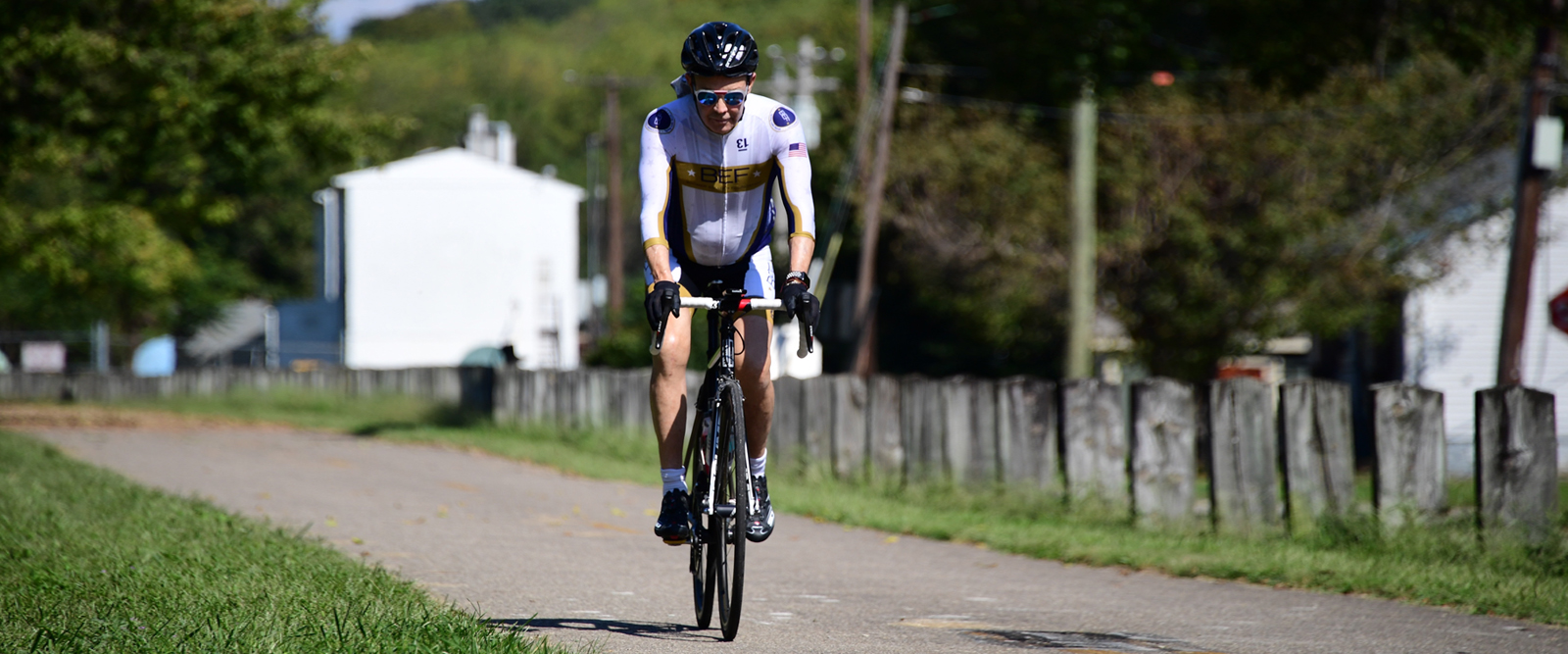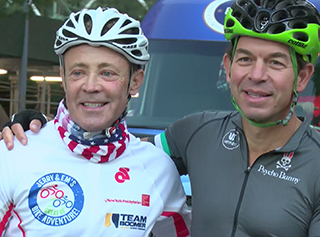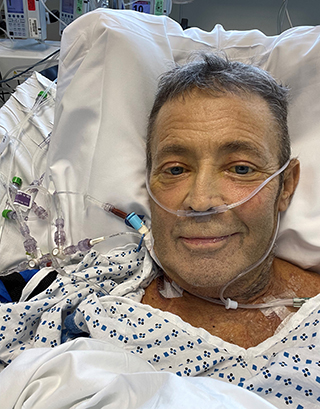For a Triple Transplant Recipient, Getting Back on the Bike is a ‘Celebration of Life’
A lung-kidney-and-liver transplant recipient, Jerry Cahill is gearing up for a 40-mile bike tour alongside his doctor, thanks to his passion for fitness and the support of his longtime care team at NewYork-Presbyterian.

Following his double-lung transplant in 2012, Jerry cycled across the country to raise awareness for cystic fibrosis.
Most days, you’ll find Jerry Cahill on his bicycle — weaving through the streets around his home in Bay Ridge, Brooklyn; cycling the loop at Prospect Park; or pedaling over the Brooklyn Bridge on his morning commute.
Jerry, 66, relishes the sights and sounds of the city with each ride — moments he doesn’t take for granted after being “at death’s door” less than two years prior, when his kidneys and liver were failing as he waited for a double transplant at NewYork-Presbyterian/Columbia University Irving Medical Center.
“Now, just being outside, breathing and moving, is such a gift,” Jerry says.
Defying the Odds
Jerry’s transplant journey began in 2012, when he received a double lung transplant. At age 10, he was diagnosed with cystic fibrosis, a genetic, progressive disease that can cause damage to the lungs, digestive system, and other organs.
“My parents were told I might not live to see my 16th birthday,” Jerry says. “I’ve heard all of those numbers, the odds of how long I will live, but I refused to give in.”
With support from his family, Jerry stayed positive and physically active. He ran on his high school cross-country team and fell in love with pole vaulting, continuing through college and jumping for the New York Athletic Club until his mid-40s. Later, he became a pole-vaulting coach at Iona Preparatory School, training high school students for state and national competitions.
“I decided at a young age to do whatever I had to, to take charge of my health,” Jerry says. “I’ve always relied on my athletic ability and competitive nature to push me to the next step.”
His athletic career was peppered with doctors’ appointments and hospital stays for his cystic fibrosis. With the condition, thick and sticky mucus can build up in the lungs, leading to blockages and infections. The disease took its toll, and though he was still coaching, frequent illnesses forced him to retire on disability from his career in the apparel industry in 2004. Frustrated by the setbacks, Jerry decided to seek care at NewYork-Presbyterian/Columbia University Irving Medical Center in 2002 to help him regain his health.
After several years of treatment, his doctors told him about the possibility of a double lung transplant.
“Cystic fibrosis is a very debilitating disease,” says Dr. Selim Arcasoy, Jerry’s pulmonologist and medical director of the lung transplantation program at NewYork-Presbyterian/Columbia University Irving Medical Center. “As it gets worse, people start losing lung function and weight, and they get sicker as they cannot fight off infection. Jerry had progressive loss of lung function and was having flare-ups requiring antibiotics and oxygen.”
On April 18, 2012, Jerry underwent a double lung transplant, performed by Dr. Joshua Sonett, chief of general thoracic surgery at NewYork-Presbyterian/Columbia University Irving Medical Center.
I decided at a young age to do whatever I had to, to take charge of my health. I’ve always relied on my athletic ability and competitive nature to push me to the next step.
Jerry Cahill
Movement as Medicine
Jerry’s commitment to fitness, coupled with the support of the physicians, nurses, occupational therapists, and many others on his transplant care team, made recovery swift.
Three months post-surgery, he celebrated by running a 10K in Central Park alongside Dr. Sonett.
He continued to stay active and became an avid cyclist, as well as a cystic fibrosis advocate for the Boomer Esiason Foundation. In 2015, Jerry completed a 500-mile bike ride, arriving at NewYork-Presbyterian/Columbia, to raise awareness for cystic fibrosis.
Each breath was a gift, and he took full advantage of his new lungs, returning to coaching, cycling across the country, and biking through Europe.
“I am able to breathe, smile, and give back because of my donor, my team of doctors, and everyone who became an integral part of my life,” Jerry says.

Jerry (left) with his pulmonologist, Dr. Selim Arcasoy, after Jerry completed a 500-mile bike ride to raise awareness for cystic fibrosis in 2015.
‘The Point of No Return’
But despite his active lifestyle, his liver and kidney health were steadily declining. Jerry’s lungs are free from cystic fibrosis, Dr. Arcasoy says, but the rest of his body still carries the disease’s genetic mutation.
The condition impacted his liver even prior to his lung transplant, and medications negatively affected his kidney function. His liver issues worsened in 2019, leading to a further decline in his kidney health. The hospital’s transplant teams met with Jerry as a precaution.
“My team was completely committed to keeping me healthy as we faced these issues head-on,” Jerry says. “In spite of the news, I was living my best life.”
He continued to push through his annual cycling fundraising events, until he hit “the point of no return” on June 27, 2021, he says.
After completing his eighth annual Bike 2 Breathe event, Jerry was immediately taken to the hospital.
“I was delirious,” he recalls. “The next thing I knew, I was in an intensive care unit on dialysis.”
A Second Gift of Life
Jerry urgently needed a kidney transplant but also had worsening liver disease. Additionally, he had an infection with fever, which needed to clear before he could be placed on the waiting list. He became progressively weaker, jaundiced, and overloaded with fluid while he was in the hospital.
“I was as positive as I could be,” Jerry says. “All I knew was I wanted more life.”
Almost a month after being admitted, Jerry was placed on the liver and kidney transplant lists.
Expecting a prolonged hospital stay before the call about an organ donor, he had a stationary bike delivered to his hospital room. But he received good news just hours later: They had a donor.
On July 22, 2021, in a collaborative, 15-hour surgery led by Dr. Tomoaki Kato, chief of the Division of Abdominal Organ Transplantation at NewYork-Presbyterian/Columbia University Irving Medical Center, and Dr. Joshua Weiner, kidney and pancreas transplant surgeon, Jerry received a new liver and kidney.

Jerry received a new liver and kidney after a 14-hour surgery on July 22, 2021.
As with his lung transplant, the care he received in the ICU, along with his physical fortitude, helped his rehabilitation.
“His recovery was remarkable,” says Dr. Kato, who is also the Edwin C. and Anne K. Weiskopf Professor of Surgical Oncology in the Department of Surgery at Columbia University Vagelos College of Physicians and Surgeons. “Sometimes patients go into the ICU for a long time and end up needing multiple medical or surgical procedures to recover. He didn’t need those. That speaks for his physical strength.”
“Jerry is such an extraordinary guy,” adds Dr. Weiner, who is also an assistant professor of surgery at Columbia University Vagelos College of Physicians and Surgeons. “Not only did his previous transplant experience help him, but he also was a fighter and determined to overcome it.”
‘The Forward of Possibilities’
Months after his transplants, Jerry graduated from relying on a walker to working his way up the small hill near his apartment unassisted.
“It was like trying to climb Mount Everest, but I just kept being relentless and doing the best I could,” Jerry says. “It was a slow process.”
He took it one day at a time and remembered a mantra of motivation his parents instilled in him: “You cannot fail.”
A quarter of a mile walk soon turned into half a mile, to five miles, then an 11-mile walk to celebrate 10-years since his lung transplant and first-year liver and kidney anniversary.
The itch to exercise never left, and Jerry got back on the bike in the fall of 2022, one year after his surgery, and later returned to coaching the pole vault.
Dr. Arcasoy, who oversees Jerry’s post-transplant care, continues to see him at least every three months. His lung function has improved following his liver and kidney transplants, he says, as the excess fluid from his organ failure no longer restricts his lungs.
“We take care of patients as a team, not only through our multidisciplinary care but as a partner with the patient,” Dr. Arcasoy says. “From the doctors to the coordinators and schedulers, creating a close relationship with the people we care for is key to a successful outcome.”
Over the course of two decades of friendship, Jerry and Dr. Arcasoy discovered their mutual love for cycling, and they’ll be riding alongside each other in the 40-mile, 2023 TD Five Boro Bike Tour in New York City.
“It’s the ultimate wish for me as a physician to be able to work with a team that can get someone like Jerry to a stage where he can bike 40 miles, and do it together as patient and doctor,” Dr. Arcasoy says. “It can’t get any better than that.”
“My phenomenal team at NewYork-Presbyterian saved me more than once and helped me keep going,” Jerry says. “Riding with Dr. Arcasoy is a celebration of life. It’s a celebration of the fact that I’m here today because of NewYork-Presbyterian, my organ donors, and my cystic fibrosis centers. I believe in living in the forward of possibilities.”
Additional Resources
Learn more about New York’s top transplant program.
Find out how you can sign up to become an organ donor.
